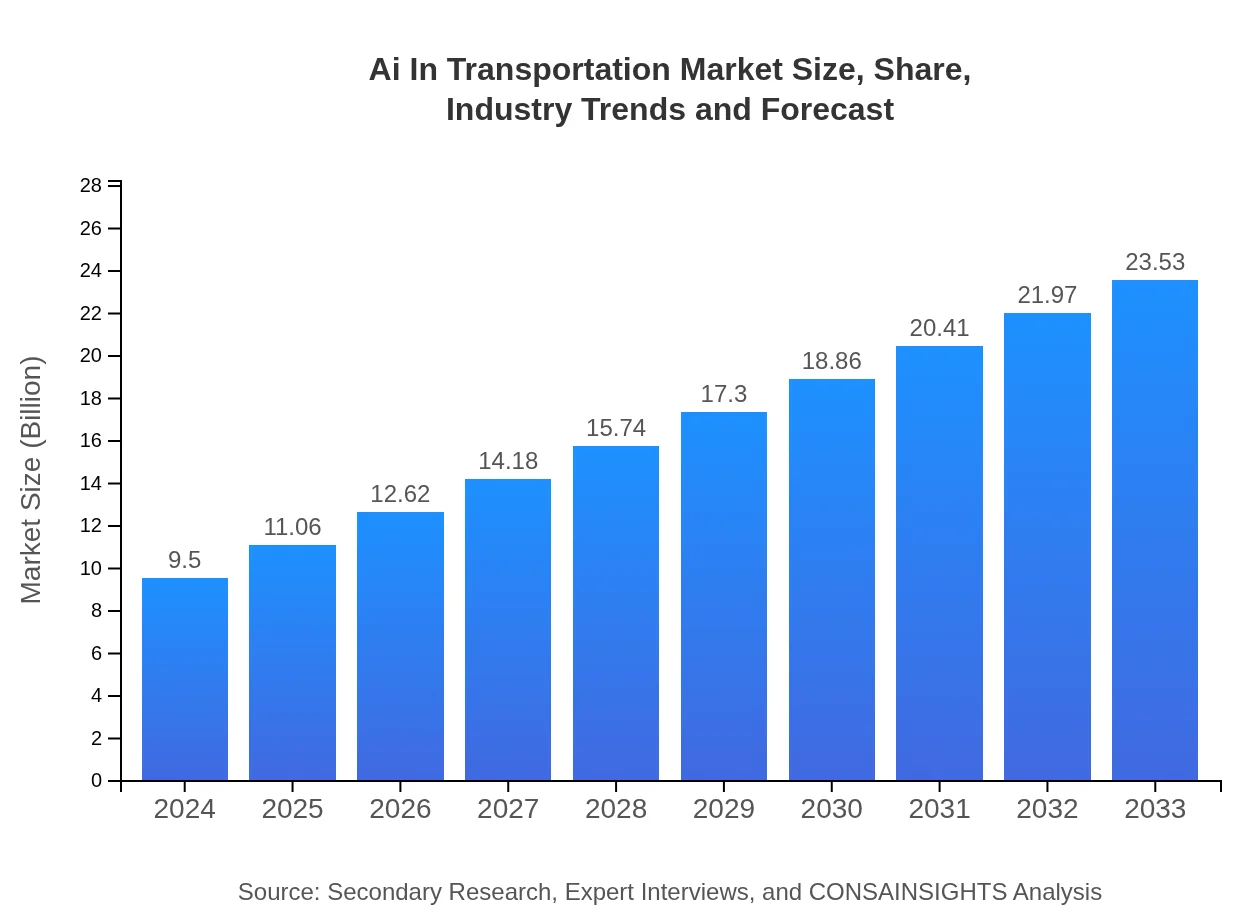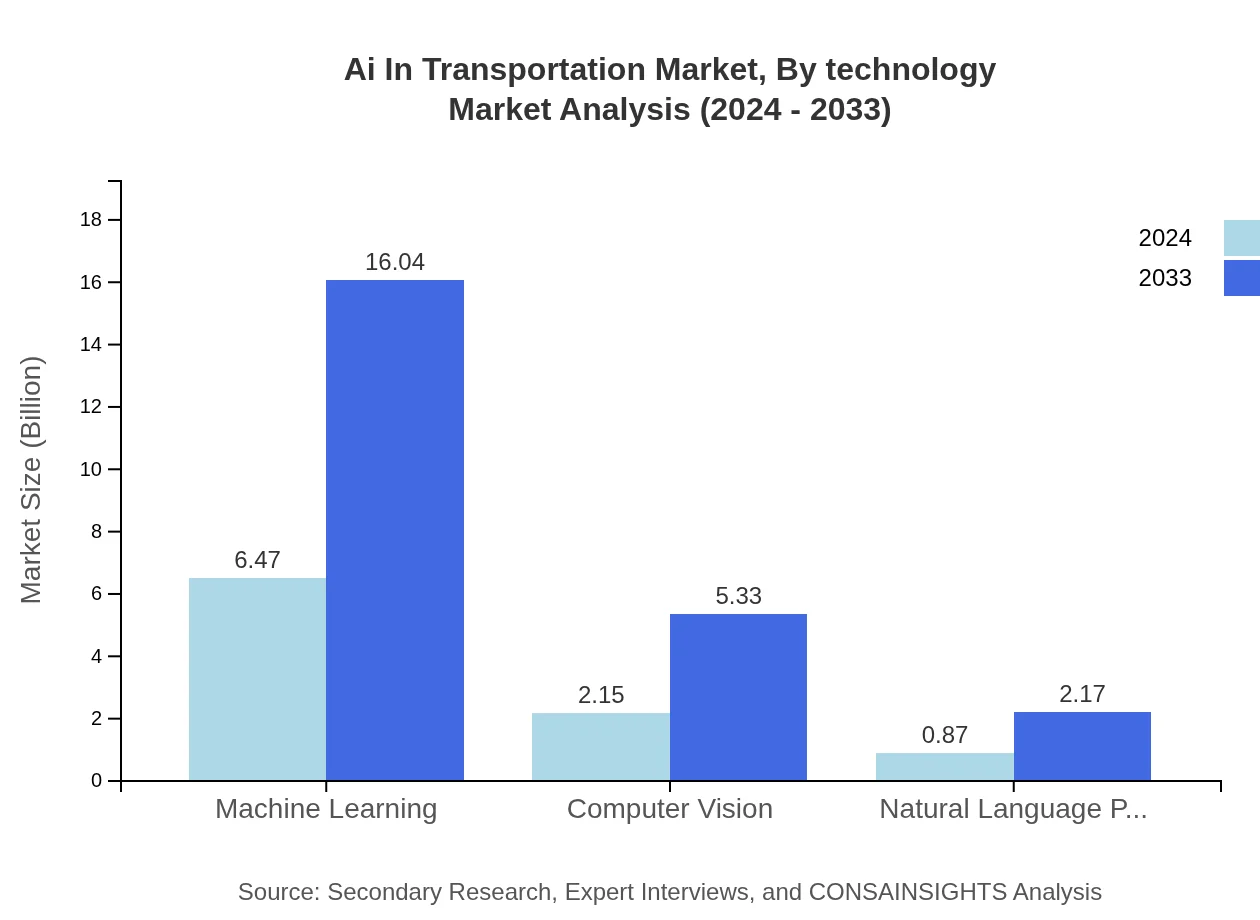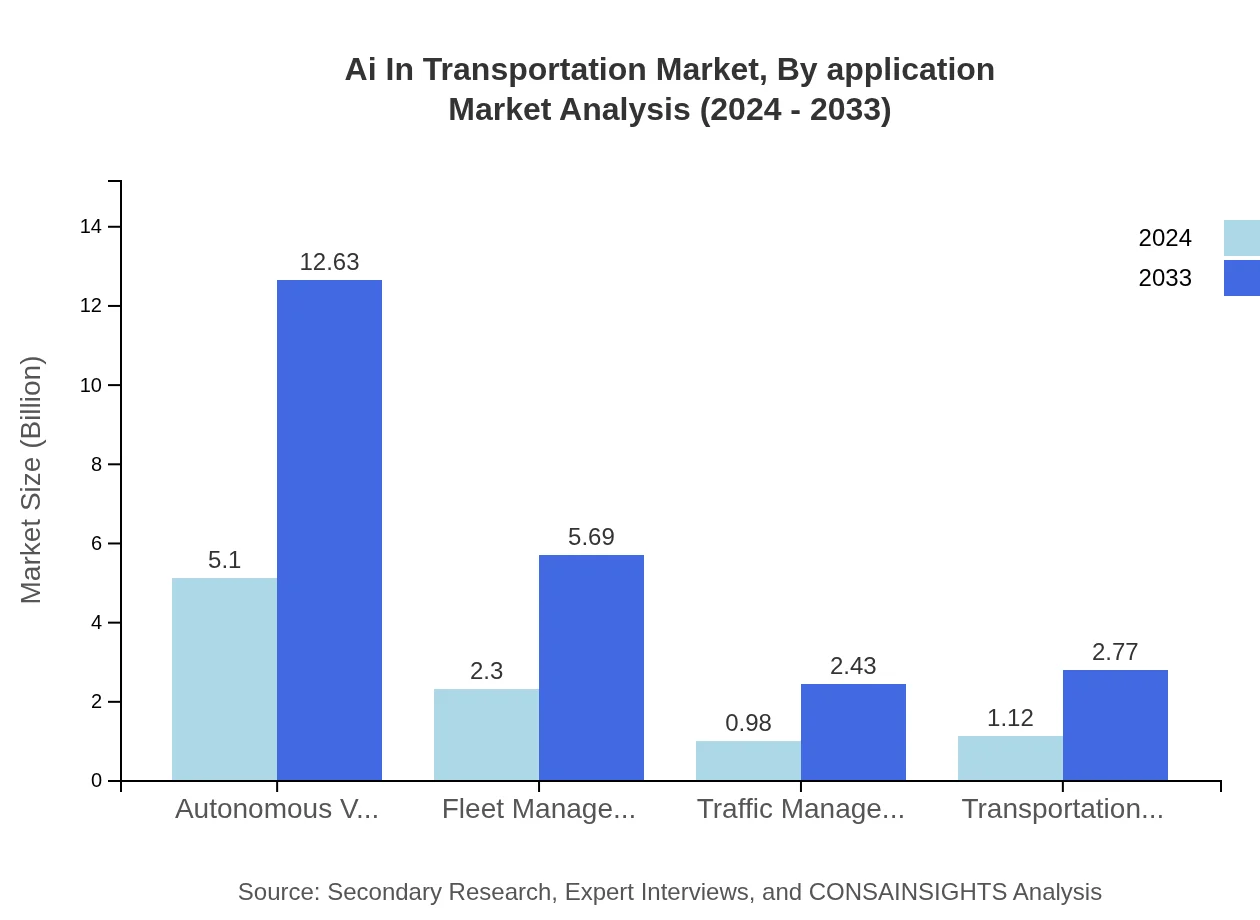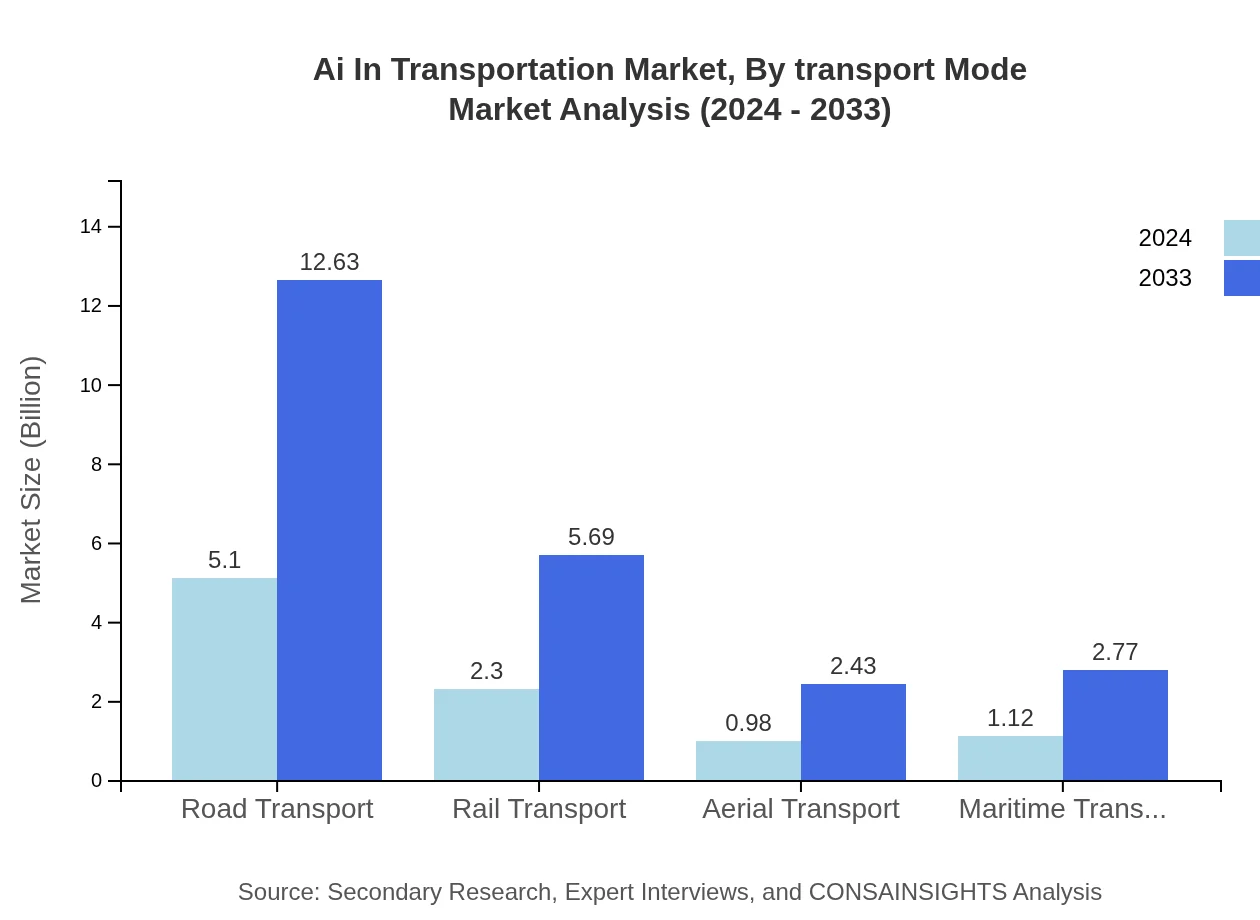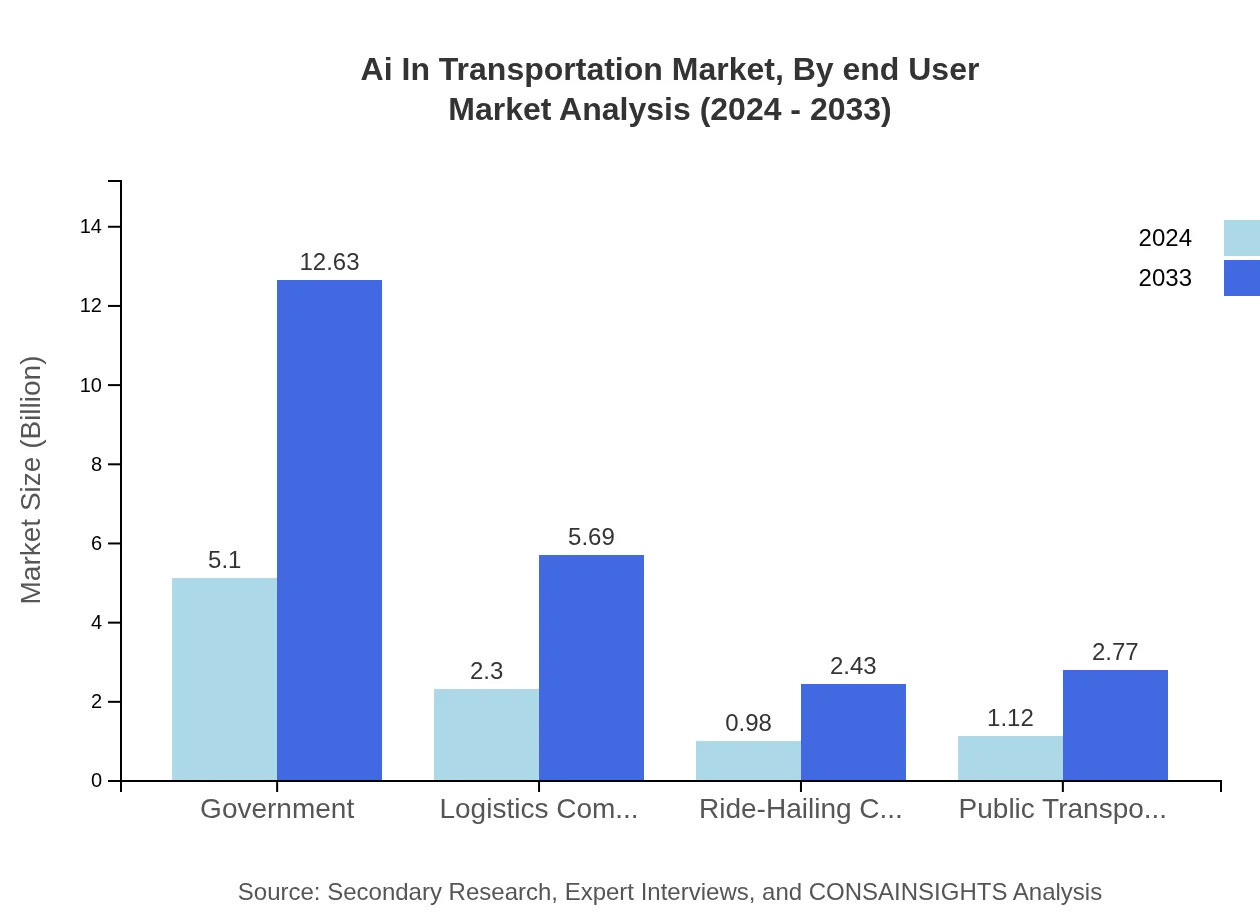Ai In Transportation
Published Date: 02 February 2026 | Report Code: ai-in-transportation
Ai In Transportation Market Size, Share, Industry Trends and Forecast to 2033
This comprehensive report on Ai In Transportation provides an in‐depth analysis of the market landscape, key trends, technological innovations, and product dynamics. Covering insights from 2024 to 2033, the report offers detailed forecasts, statistical data, and regional breakdowns, enabling stakeholders to make informed strategic decisions and investments in this transformative sector.
| Metric | Value |
|---|---|
| Study Period | 2024 - 2033 |
| 2024 Market Size | $9.50 Billion |
| CAGR (2024-2033) | 10.2% |
| 2033 Market Size | $23.53 Billion |
| Top Companies | TransTech AI Solutions, SmartMove Systems, AutoNav Technologies |
| Last Modified Date | 02 February 2026 |
Ai In Transportation Market Overview
Customize Ai In Transportation market research report
- ✔ Get in-depth analysis of Ai In Transportation market size, growth, and forecasts.
- ✔ Understand Ai In Transportation's regional dynamics and industry-specific trends.
- ✔ Identify potential applications, end-user demand, and growth segments in Ai In Transportation
What is the Market Size & CAGR of Ai In Transportation market in 2024?
Ai In Transportation Industry Analysis
Ai In Transportation Market Segmentation and Scope
Tell us your focus area and get a customized research report.
Ai In Transportation Market Analysis Report by Region
Europe Ai In Transportation:
Europe sees significant investments in smart transportation, with market values rising from 2.76 in 2024 to 6.84 by 2033. The region benefits from mature technologies, supportive governmental policies, and a strong focus on environmental sustainability, making AI integration in transport a top priority.Asia Pacific Ai In Transportation:
In Asia Pacific, the market is witnessing rapid growth with 2024 figures of approximately 1.95 units increasing to 4.84 units by 2033. Technological innovations and government initiatives drive adoption, making the region a critical hub for advanced transportation solutions.North America Ai In Transportation:
North America remains a leader in AI integration in transportation, evidenced by market figures of 3.18 in 2024 expanding to 7.89 by 2033. High investment levels in R&D, coupled with strong regulatory frameworks and a competitive environment, reinforce its market position.South America Ai In Transportation:
South America’s market, with a starting value of 0.93 in 2024 and an expected rise to 2.31 by 2033, is progressively embracing AI technologies. Enhanced infrastructure and growing digital transformation are paving the way for future developments in the region.Middle East & Africa Ai In Transportation:
The Middle East and Africa region, starting at 0.67 in 2024 and expected to reach 1.65 by 2033, is gradually adopting AI-driven transportation solutions. Strategic investments in infrastructure and increasing awareness about technological benefits are enhancing market prospects in these emerging economies.Tell us your focus area and get a customized research report.
Ai In Transportation Market Analysis By Technology
The technological segment, primarily driven by machine learning, computer vision, and natural language processing, stands at the forefront in transforming transportation systems. In 2024, machine learning dominated with market size figures at 6.47, set to increase to 16.04 by 2033. Similarly, computer vision and natural language processing have steady shares of 22.65% and 9.2% respectively, underscoring their role in enhancing decision-making, safety, and operational efficiency. Innovations in sensor technology, data analytics, and integrated communication systems further reinforce the importance of this segment.
Ai In Transportation Market Analysis By Application
The application segment can be dissected into several key areas including government operations, logistics companies, ride-hailing services, and public transport operators. Government initiatives exhibit significant market presence with sizes growing from 5.10 in 2024 to 12.63 by 2033, maintaining a steady share over the years. Logistics companies and ride-hailing services, though smaller in absolute terms with sizes of 2.30 and 0.98 respectively in 2024, are crucial for modernizing urban mobility. Public transport operators, with a continuous demand for efficient systems, further ensure that AI applications deliver real-time solutions for route management, safety, and customer engagement.
Ai In Transportation Market Analysis By Transport Mode
The mode of transport segment includes categories such as autonomous vehicles, fleet management, traffic management, and transportation safety, along with conventional road, rail, aerial, and maritime transport. In 2024, autonomous vehicles lead this segment with a market size of 5.10, expanding to 12.63 by 2033, indicating strong trust in automation. Fleet management and traffic management services maintain robust shares and contribute significantly to reducing congestion and improving fuel efficiency. Additionally, road, rail, aerial, and maritime systems benefit from AI integration by optimizing scheduling, maintenance routines, and operational logistics, thereby ensuring smoother transit operations across all modes.
Ai In Transportation Market Analysis By End User
The end-user segment reflects the diverse group of stakeholders benefiting from AI innovations in transportation. These include city planners, individual commuters, freight companies, and multinational enterprises. AI solutions are tailored to address the specific needs of each end-user group—from enhancing commuter safety and comfort to streamlining freight logistics and regulatory compliance for large corporations. The tailored applications ensure that the technology meets distinct regional and industry-specific requirements. As the market evolves, continuous innovation driven by end-user feedback will promote further customization and integration of AI-based solutions, ultimately driving widespread adoption and sustainable growth.
Ai In Transportation Market Trends and Future Forecast
Tell us your focus area and get a customized research report.
Global Market Leaders and Top Companies in Ai In Transportation Industry
TransTech AI Solutions:
TransTech AI Solutions is known for its pioneering work in developing integrated AI platforms for smart transportation. With innovative solutions in autonomous driving, predictive maintenance, and real-time analytics, the company has set benchmarks in enhancing operational efficiency and safety across global transit networks.SmartMove Systems:
SmartMove Systems leverages advanced machine learning algorithms and sensor technologies to optimize route planning and traffic management. By facilitating seamless data integration, the company supports transport operators in reducing costs and ensuring timely service delivery, making it a leader in urban mobility transformation.AutoNav Technologies:
AutoNav Technologies specializes in the development of autonomous vehicle solutions and AI-driven fleet management systems. Their cutting-edge platforms are widely adopted by both public and private sector clients, driving innovation in automated transport and contributing significantly to enhanced road safety and operational efficiency.We're grateful to work with incredible clients.









FAQs
What is the market size of AI in Transportation?
The global AI in Transportation market is projected to reach $9.5 billion by 2033, growing from $4.2 billion in 2024, at a CAGR of 10.2% during this period.
What are the key market players or companies in the AI in Transportation industry?
Key players in the AI in Transportation market include Tesla, Waymo, Uber Technologies, AI Inc., and IBM. These companies lead innovations in autonomous vehicles, logistics optimization, and AI-driven transportation solutions.
What are the primary factors driving the growth in the AI in Transportation industry?
The growth of the AI in Transportation market is driven by increasing demand for autonomous vehicles, advancements in machine learning technologies, government investments in smart transportation, and the need for efficiency in logistics operations.
Which region is the fastest Growing in the AI in Transportation market?
North America is the fastest-growing region in the AI in Transportation market, with projections of $7.89 billion by 2033, followed by Europe and Asia Pacific, with $6.84 billion and $4.84 billion, respectively.
Does ConsaInsights provide customized market report data for the AI in Transportation industry?
Yes, ConsaInsights offers customized market report data tailored to specific needs within the AI in Transportation industry, providing detailed insights into segments, trends, and regional markets.
What deliverables can I expect from this AI in Transportation market research project?
From this project, you can expect comprehensive reports, detailed market size projections, segment analysis, competitive landscape insights, and a thorough examination of market trends and growth drivers.
What are the market trends of AI in Transportation?
Current trends in the AI in Transportation market include increased integration of AI with IoT, growth in smart infrastructure, advancements in computer vision and machine learning applications, and rising investments in autonomous mobility solutions.

